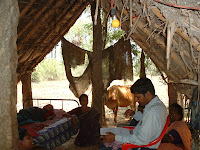 Lets meet Mugambwa who is soon to go home after 3 months in the orthopaedic ward supported by our team and by Hospice Africa Uganda. He is unfailingly cheerful despite having cancer for many years which recently meant 4 operations (2 on each leg) and without anyone to care
Lets meet Mugambwa who is soon to go home after 3 months in the orthopaedic ward supported by our team and by Hospice Africa Uganda. He is unfailingly cheerful despite having cancer for many years which recently meant 4 operations (2 on each leg) and without anyone to care  for him or prepare food. He now is pain free and delighted with his new wheelchair. Challenge; how do you go uphill without tipping over backwards a problem he dramatically demonstrated to us. Some quick thinking and advice to lean forwards (and have someone behind!)he makes it up the slope at last. Sometimes it is simple solutions that make the biggest difference. Joseph has so many sores he cannot find
for him or prepare food. He now is pain free and delighted with his new wheelchair. Challenge; how do you go uphill without tipping over backwards a problem he dramatically demonstrated to us. Some quick thinking and advice to lean forwards (and have someone behind!)he makes it up the slope at last. Sometimes it is simple solutions that make the biggest difference. Joseph has so many sores he cannot find  a comfortable position and simply tries to lie as still as possible. In the UK we would have sophisticated wound dressings and special pressure relieving mattresses. However, some basic advice, instruction for his mother, help to supply dressing materials, ground up antibiotic powder sprinkled on the wounds and the use of surgical gloves filled with water to relieve pressure made a huge difference. 'I am feeling a bit fine and there is no paining' he told us. This elderly man has been receiving extensive treatment for his cancer having travelled overland from Bukavu Hospital in eastern Congo
a comfortable position and simply tries to lie as still as possible. In the UK we would have sophisticated wound dressings and special pressure relieving mattresses. However, some basic advice, instruction for his mother, help to supply dressing materials, ground up antibiotic powder sprinkled on the wounds and the use of surgical gloves filled with water to relieve pressure made a huge difference. 'I am feeling a bit fine and there is no paining' he told us. This elderly man has been receiving extensive treatment for his cancer having travelled overland from Bukavu Hospital in eastern Congo . He is about to start radiotherapy but they had run out of money for food unless a cow can be sold back in Congo and the money sent over! Thanks to a generous donation we are able to help with these practical needs
. He is about to start radiotherapy but they had run out of money for food unless a cow can be sold back in Congo and the money sent over! Thanks to a generous donation we are able to help with these practical needsNumbers being referred continue to increase and the team can feel under pressure both to care for patients as well as carry out research, develop the service and offer teaching. Our office is a real blessing even if pretty cramped at times.
 Here is the team celebrating my birthday.
Here is the team celebrating my birthday.Time away is also important and my non-swimming colleagues were brave enough to go on an outing to Lagoon Resort on the shores of Lake Victoria.
What news of the planned BSc in palliative care? The team at Hospice and Makerere
 have been working hard and we are in the process of admitting students but due to a number of factors we start the course in Feb 2010. It is a little disappointing but also will allow a more prepared start to this exciting programme.
have been working hard and we are in the process of admitting students but due to a number of factors we start the course in Feb 2010. It is a little disappointing but also will allow a more prepared start to this exciting programme.Our research agenda continues to develop with completion of a long planned piece of work to find out the needs patients have in Mulago. Building capacity for research is key and we were delighted to welcome Prof Barbara Jack to support nurse training in qualitative research. The day was a great success and we hope to develop this collaboration.
My next post will be from India as I leave tomorrow for a teaching visit. We will be carrying out a state wide training in Mizoram as well as other visits. I am dreaming of that first dosa!





































 As you can see from their website http://www.palliumindia.org/, Pallium India is committed to supporting the development of palliative care in a number of ways. Their activities include supporting clinical services, providing education and offering advocacy for access to morphine. We have worked together for 2 years now mainly supporting education and training, although relationships go back nearly 10 years since I first met the founder of Pallium India and now my good friend Prof Rajagopal.. We are also discussing plans to develop mentorship for new centres.
As you can see from their website http://www.palliumindia.org/, Pallium India is committed to supporting the development of palliative care in a number of ways. Their activities include supporting clinical services, providing education and offering advocacy for access to morphine. We have worked together for 2 years now mainly supporting education and training, although relationships go back nearly 10 years since I first met the founder of Pallium India and now my good friend Prof Rajagopal.. We are also discussing plans to develop mentorship for new centres.









